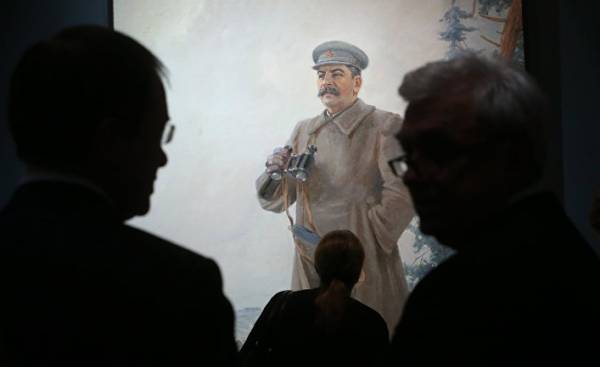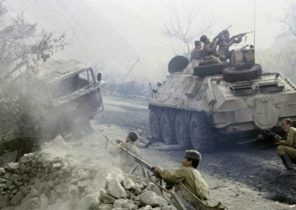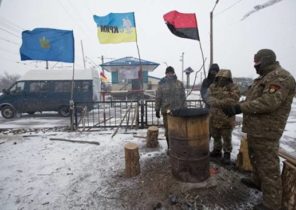
This story could begin in a cold evening in December, 1878, when the Caucasian sky rose the first star, and was born the son of a shoemaker Vissarion Dzhugashvili and Ekaterina Geladze — seamstresses and laundresses. It could be the story of the career of the Georgian priest who holds services in the Cathedral of Tiflis and faithfully follows the example of the apostles, who preached in Colchis at the dawn of Christianity.
Whether high tuition fees in the Seminary, or the works of Darwin and Marx (which I read secretly on the lessons of young Joseph) made the story to turn the other way. Biography of Stalin broke away from the Caucasian mountains and entered the history of the world.
Someone like king
Orthodox philosopher Nikolai Berdyaev wrote in his book “the Russian idea”: “1666 began in Russia, the Kingdom of the Antichrist”. By this logic, Christ reigns in heaven and on earth remains the only place for his antagonist. This Gnostic dichotomy for centuries determined the Russian understanding of power. Suffice it to say that the reality in which formed the worldview of the future “Sun of Nations”, as it later became known as Stalin, was lying somewhere at the intersection of the world of professional criminals and revolutionaries with whom they shared a chamber in the king’s prison.
Only in 1917 unleashed their overall talents, languishing to this hour behind bars. As steeped in symbolism in the poem “Twelve” by Alexander Blok: “Katka And where?— Dead, dead! / Shot through the head! That, Katka, excited? No GU-GU… / you Lie, carrion, in the snow!.. / Revolutionary keep step! / Tireless enemy!” As Stalin once during during the revolutionary chaos to suppress the riots in the groups consisting of former tsarist political prisoners.
It is difficult to say at what precise moment the ambition of the people’s Commissar for nationalities began to grow and his goal was absolute power. On the eve of his first brain hemorrhage in may 1922, the Bolshevik leader Vladimir Lenin (who was unable to recover after the assassination attempt in 1918, when he received two bullets “a gift” from eserki-revolutionary Fanny Kaplan, who considered him an enemy of socialism) was assessed Stalin is not particularly high. He chose for his seemingly boring and bureaucratic work for the “national” front.
Meanwhile, Stalin had an excellent opportunity to conduct the first in his career (this time bloodless) change of personnel. This process has acquired a total character: Stalin’s broom swept everyone from party leaders to typists, to the place which came loyal people.
In the future this scheme will be used many times. It is worth noting that Stalin did not invent anything new here. On the contrary, he acted with characteristic impostors follows (as told to the above-mentioned example), because it was the mechanism in such form and in such scale existed only in Russia. Ruthless purges and the music, the rhythm which is beaten off the heels of the staff of the secret police OGPU (predecessor of the NKVD and the KGB), Stalin down to a point when he, years later, to question his mother about his experiences in Moscow, calmly answer: “I was there someone like the king.”
The last will of Lenin
However, in April 1922, to these words was far away. How did it happen that this, as with disdain said inner enemy of Stalin, Leon Trotsky, “the outstanding mediocrity” then got up to the top? At the turn of 1922 and 1923 gradually dying Lenin (in December 1922, he suffered a second stroke and withdrew from politics in March 1923, the third, then the leader of the Bolsheviks was partially paralyzed, he lost his speech) I decided to write to the members of his party a few words.
It is famous in the Bolshevik world “Letter to Congress” was a political will in which Lenin questioned the leadership qualities of all members of the Politburo, the highest party body. For example, he pointed out that Stalin because of his rudeness and unbalanced nature “becomes intolerable in a Secretary-General”.
Best Lenin spoke about Trotsky, however, like an old Patriarch he remembered non-Bolshevik past, adding that it is impossible to put him in the guilt. He described Landau as “the most capable man in the present Central Committee”, which is brilliant but has not appointed his heir in his place. Perhaps Lenin wanted a collective leadership in which all six mentioned the Bolshevik leaders (Zinoviev, Kamenev, Trotsky, Stalin, Bukharin and Pyatakov) will work together.
Combines the power of a few people with such ambitions and characters? No more real idea than the fight against alcoholism in the country of Gogol and Pushkin! Not surprisingly, when the letter appeared, its publication was only made by Trotsky. Vladimir Ilyich could die at any moment, time played an important role here.
The only attempt to publish the letter during the life of the leader was taken in July 1923. In the clash between Trotsky and Stalin, the first suffered a crushing defeat: the majority of management representatives decided that the last will of their leader to disclose is not necessary, since the text could provoke unnecessary disputes. the year after the next stroke, Lenin died. A power struggle broke out with renewed vigor.
The winner goes to the winner of the compass
The situation didn’t bother Stalin alone. As he recalled his Secretary, Boris Bazhanov, he was in excellent spirits, and glowed with happiness. While Lenin was alive and could recover, Stalin felt threatened. In the year before the death of the leader, he hid his doubts, showed incredible composure and the ability to maneuver, thus won greater authority than all the other Bolshevik leaders. Now due to the fact, as described by Lenin in his Testament, Stalin was waiting for a fight.
At that moment, he showed not only his ability to survive, but also tactical skill in the manipulation of truth that was known to his competitors. He took the post of General Secretary of the party and concentrated in the hands of all the funeral arrangements, took under his protection all the Leninist heritage, — in short, we have created an image of the chief expert and the interpreter of Leninism.
Under the pressure of Stalin’s plans, in the maelstrom of the shares on the sacralization of the leader (a renaming of settlements, the construction of the mausoleum “Lenin’s call” — a set of the Bolshevik party 200,000 workers) the voice of Trotsky (it is the most serious at the time) competitor sounded quieter. Stalin did not commit a single error, not made a single false move. He appeared humble, friendly and good-natured man who holds in hands compass of Marxism-Leninism.
In this clash of the titans Bolshevik Trotsky appeared only one chance to change the course of events. It was the XIII Congress of the RCP(b) on which Lenin’s widow Nadezhda Krupskaya, demanded to acquaint delegates with the will of the deceased, including to publish unflattering to Stalin PostScript. Stalin knew that at this moment its fate is decided, because Lenin died just four months earlier and his credibility were huge. However, Stalin was a skilled player and he agreed to make a speech at the Congress Zinoviev. That in gratitude for such a generous gesture (and a concession) stated that Lenin’s fears about Stalin, fortunately, proved to be completely unfounded. It repeats Kamenev urged the Central Committee to leave the “Soso” to his high office.
Trotsky expressed his disgust for this “theater” unhappy with mine, but did nothing. Lenin’s Testament was revealed only to a narrow circle of Bolsheviks, in the end, XIII Congress not only killed Stalin, but also strengthened his position. However, he still remained too weak to encroach on power, and build their position based on a tactical Alliance with Kamenev and Zinoviev. “The letter” Lenin, he could not destroy, but he can destroy people, which he presented in a better light than him.
Between Ivan and Boris
Political biography of Joseph Stalin — is a cross between stories of his two prominent predecessors of Ivan the terrible and Boris Godunov. Godunov, the typical “grey cardinal”, used for the seizure of power by the marriage of his sister Irina were feeble-minded son of Ivan IV, Fedor. The failure of the young king to perform his duties has created ideal conditions for boyar Godunov, who was able to intrigue and to arrange show trials “of political opponents of Fedor”. For example, a Regent of Ivan Petrovich Shuisky sent to a distant monastery, where he then “accidentally poisoned by carbon monoxide”. Nothing like? Before the expulsion of the Soviet Union (in 1929) Trotsky had first to go to exile in Alma-ATA. He later fled to Mexico, but even there he caught armed with an ice pick NKVD agent…
Several centuries earlier, concentrating in its hands all the power, Boris Godunov wanted to get both the highest title in the country — groom nobleman and Royal servant. It was only a matter of prestige, but do not remind the history of the Lord desire to be called Stalin General Secretary of the Communist party of the Soviet Union and head of government of the Soviet Union?
In turn, episodes in the life of Ivan the terrible so like the episodes in the life of Stalin, in schematic form their history could be a single biography. Both magnum Opus was the creation of the secret political police, which allowed the best way (in line with the realities of the era) control subjects. Ivan IV created oprichnina, which was involved not only in the destruction of Novgorod, but also in the mass killings and deportations (although those were not Russian invention, it has been used in Byzantium). Bloody cohorts of Felix Dzerzhinsky (the Creator of the first Bolshevik secret police state — the Cheka) was to take one example.
“Who will remember this trash ten or twenty years?— wondered Stalin at a reception at the Voroshilov in the presence of Budyonny, Mikoyan and Molotov during the period of the Great terror. — Who remembers the names of the boyars, which got rid of Ivan the terrible? Also no. People had to know that he got rid of all the enemies. In the end they all deserved it. (…) Ivan killed too few of the boyars, he had to execute all and create a new state”.
It is no coincidence that film Director Sergei Eisenstein made a hero of one of his most important films of Ivan the terrible. To quote again Stalin’s Secretary Bazhanov. “Ivan the terrible change made to glorify and justify the Stalinist terror; the story of de is repeated: Ivan the terrible, as if taking care of the needs of the great Russia, impaled and chopped the head of the boyars, and Stalin shot his Bolshevik boyars, also traitors of the country”.
Communist “Rome”
Lenin in his own way embodied the idea of the “Third Rome”, making Moscow the capital of world communism. Russia and the only one that could now act as a center of revolutionary policy, directing its activity to the approaching end of earth’s history, that is, the realization of the dream of a Communist “Paradise”. With all the anti-religious essence of the new regime is reminiscent of the Messianic Russian priests of the XVI century, who after the fall of the Byzantine Empire (acting as the successor of the Roman Empire), proclaimed Moscow the last and only Rome.
It seems that the better and deeper just realized that Stalin, who resisted the so-called internationalists, headed by Kamenev, Radek and, of course, Trotsky, who wanted to move the capital to Berlin, London or Paris. Extremely stupid idea, you could say Stalin because communism can become a reality, but growing out of the Russian apostolate.
In this lies the answer to the question why “the crafty Georgians” has been successful? He skillfully and permanently fused together Marxism and the Messianic idea? Is it possible to find in Stalin’s life turning point when the future of an Orthodox priest he turned into a power hungry king-pretender?
This turning point was not. The Bolsheviks, and Stalin was a Bolshevik to the marrow, was an early believer in the first place in violence. Macabre mix: the Byzantine “East” and vulgarized “the West” of the Enlightenment. The tradition of Maximilien Robespierre, augmented the spirit of the tsarist autocracy.
Long shadow Soso
Terror and violence were the Foundation on which was built the Bolshevik revolution and cosmology. The intellectual model for her not only was the French predecessor of XVIII century, which was later called the great, and Tsar Ivan the terrible. In this sense, Stalin looks like the most perfect creation of the Bolshevik test, because he believed in the necessity of social engineering that cannot proceed without shedding blood. Lenin well knew about it. So, the message of the birth in Russia of the Antichrist was an exaggeration? While the absence of the other will impending Apocalypse, he says, be quick about it.
Meanwhile, you can fully agree with Boris Bazhanov is that in Russia history likes to repeat itself. About six months ago in the Russian city of Orel, a monument to Ivan the terrible. The Parallels between him and Stalin can be carried out indefinitely. On the one hand, they simplify political realities, but focus on the important aspect of Russian politics: on the permanence and durability of mechanisms and practices which subordinate the inhabitants of the Palace in the Kremlin. The Kremlin, which was the abode of the kings (and impostors), then Stalin, now Putin.
Mikolaj mirowska — historian, employee of the Museum of the national liberation traditions in Lodz, author of the book “the Permanent revolution of Leon Trotsky”.
Ian Raevskii — the poet laureate of Polish Nationwide poetry contest behalf of Rafal Wojaczek (Rafał Wojaczk).







